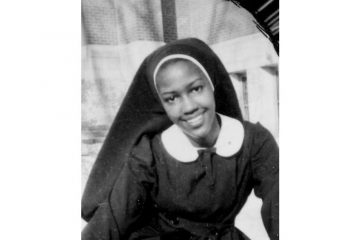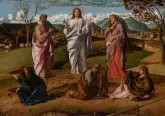The Catholic Moment: The glory of the Lord shall be revealed
December 4, 2011
By Sister Betty Jane Lillie, SC
Second Sunday of Advent: Isaiah 40: 1-5, 9-11; Psalm 85: 9-14; 2 Peter 3: 8-14; Mark 1: 1-8.
In this beautiful season of Advent, one can realize a sense of expectation of the coming of the feast of the birth of Christ.
In our readings this week, we sense the longing of the ages for the Messianic person who would bring salvation and well-being to the world.
The passages of our readings are woven together in a pattern of promise and fulfillment. The text from Isaiah is reflected in Matthew 3:3, Mark 1:3, and Luke 3:4-6. This prophet, generally referred to as “Second Isaiah” (Isaiah 40-55), was announcing the end of the Babylonian Exile and the comforting aspect of the restoration of the Israelites to their own homeland of Judah. His language jubilantly calls for preparing the way for the Lord as a straight and level highway, and he describes the coming of the Lord in glory (Isaiah 40:3-5).
The message was so magnificent that it could be shouted far and wide as from the top of a high mountain. The word would be spread abroad to God’s people under the inclusive titles of Zion, Jerusalem, and Judah. The promise of a Messiah would be fulfilled, for He would come with might and tenderness under the figure of a shepherd who would carry His people in His arms.
All of those messianic hopes are reflected in our Gospel reading that expands on the prophecy of Malachi 3:1, which Mark quoted as he introduced John the Baptist as the forerunner to the Messiah (Mark 1:2). The Baptist was the messenger who prepared the way for Jesus in preaching a baptism of repentance for the forgiveness of sins.
John referred to the baptism he was doing as a baptism with water, in contrast to the baptism of the one who would come after him who would baptize with the Holy Spirit. The very next verse that follows our Gospel passage relates that in those days Jesus came to Nazareth of Galilee and participated in the washing ritual that John used. A moment of great significance followed in which the transition from John’s leadership moved to its messianic fulfillment in the coming of Jesus. What followed was the great event of the baptism of Jesus with its apocalyptic overtones of the descent of the Spirit and the voice of the Father (Mark 1:9-11). God had dramatically revealed at that moment his presence in the history of salvation.
By historical hindsight the time of waiting for the coming of the Messiah may seem very long. From the time of the prophecy of First Isaiah (742 BCE) to the time of the birth of Jesus (4 BCE) was more than seven hundred years. However, the Second Letter of Peter to his beloved people reminds them, and us, that in the infinity of God’s eternal mentality time stands in the never-passing present. What some count as slowness is in actuality God’s forbearance so that all can reach repentance. But the day of the Lord will come, and we need to consider what sort of persons we ought to be in living lives of holiness and godliness, as we wait for the coming of the Lord (2 Peter 3:8-14).
With the psalmist we can reflect that God’s salvation will surely come in steadfast love with righteousness and peace (Psalm 85:9-14).













